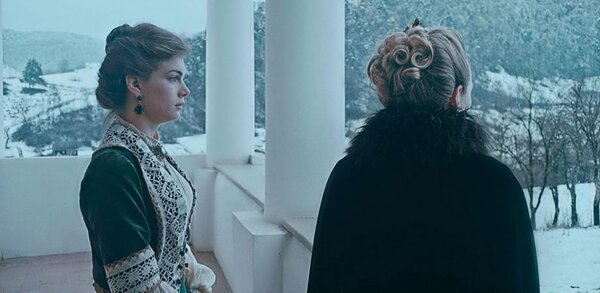CRISTI PUIU: MALMKROG (2020) - NEW YORK FILM FESTIVAL MARINA PALLI AND DIANA SAKALAUSKAITÉ in MALMKROG Idle rich with a lot to talk about, c. 1900
MARINA PALLI AND DIANA SAKALAUSKAITÉ in MALMKROG Idle rich with a lot to talk about, c. 1900I reviewed Cristi Puiu's
The Death of Mr. Laaarescu as part of the 43rd New York Film Festival in 2005. It was my first press screening at my first NYFF. It's also credited with spearheading a "Romanian New Wave."
Malmkrog is named for a luxurious estate in Transylvania where the action, if we can call it that, transpires. Five Russian aristocrats in 1900, speaking to each other in stilted French as was their custom, talk from before lunch till after dinner about a variety of general subjects drawn from a book by the Russian 19th-century philosopher Vladimir Solovyov called
Three Conversations. A 1915 English version is headed "War and Christianity from the Russian Point of view." It all goes to show the idleness of Russian aristocrats as seen by a latter-day Romanian, and mind-sets in which liberalism is a mask for colonialism and racism. It is largely a sterile exercise, more stagnant pond than New Wave, but the beautiful staging and disciplined acting are wonders to behold.
Stilted French - that is a determining factor. This doesn't have the quality of speech. There are two men - one man, a general, having left early - and three women. Besides war, the place of Russia in Europe and the world is another topic, and the existence of evil in the world a third big one. There are some characteristics attached to the speakers. For instance, it's the general's wife, Ingrida (Diana Sakalauskaité), who defends war. The letter she reads about her husband's satisfaction at killing a horde of Ottoman Bashi-bazouk soldiers as punishment for their hideous massacre of a town full of Armenians is one of the film's more memorable moments. The "Franco-Russian" Edouard (Ugo Broussot, a theatrically-trained French actor), understood to be a prosperous businessman, expounds at length (several prominent reviews, Jonathan Romney's for
Screen Daily and Boyd van Hoeij's for
Hollywood Reporter, refer to it as "mansplaining") on Russia's role as a "European" civilizer of the world, in a way that incorporates Solovyov's racist attitude to the "yellow-faced" Chinese. Two other women, Madeleine (Agathe Bosch), a dryly intellectual middle-aged woman, and Olga (Marina Palii), young and condescended to but presumably Nikolai's wife, complete the endlessly chattering group.
Why is all this relevant, and what makes three hours and twenty minutes of stilted philosophical debate material for a film? The answer isn't evident, and this is a step backward, or further backward, from the lively, humane Cristi Puiu who made
Mr. Lazarescu. This is more a test for film buffs and particularly festival-goers who pride themselves on their stamina and Olympic-level attention spans. It's like sitting through a Wagner opera if you're not a Wagner fan, but without the beautiful music. One reviewer recommended coffee "or something stronger."
There are moments or hints of excitement. We see in his own shortest of the five chapters headed "István," headed for the butler, who directs a team of nearly silent and diligent servants the outwardly "liberal" five conversationalists studiously ignore, that he hits a kitchen employee guilty of making bad - or could it be lightly poisoned? - tea. Later, there's a disturbance and loud music heard and the bell of the host Nikolai (Frédéric Schulz-Richard) is not answered. Then there is a wild chase of figures from the kitchen and explosions, with the five dropping to the floor. I thought revolution had come, and they had died. But we see them in the distance later out in front of the estate, mysteriously congregating. Maybe it was only firecrackers - after all, this was Christmas Eve. The sounds in the background, perhaps including a music lesson for a child, and the work of the servants, including the bathing and dressing and bedding of a member of the group who is unwell, show Puiu's meticulous attention to every detail, including of course furnishings and costumes. But one detail that has eluded him: making this action interesting or relevant to us.
"A pristine, sometimes terrifying vision, of the shimmering violence beneath the colonialist's veneer of politesse" says a current NYFF tag for this film. Nice one. But you can't sell this dry summary of a dated book that facilely.
Malmkrog, 200 mins., debuted at the Berlinale FEb. 2020; Belgrade, Vilnius (internet), Cluj, and was screened online for this review as part of the New York Film Festival (Sept. 17-Oct. 11), hybrid with virtual and drive-in screenings.





